International Public Sector Accounting Standards (IPSAS) are a set of accounting standards issued by the IPSAS Board for use by public sector entities around the world in the preparation of financial statements. These standards are based on International Financial Reporting Standards (IFRS) issued by the International Accounting Standards Board (IASB).
Mahatma Gandhi National Rural Employment Guarantee Act 2005 or MGNREGA, earlier known as the National Rural Employment Guarantee Act or NREGA, is an Indian labour law and social security measure that aims to guarantee the 'right to work'. This act was passed in 23 August 2005 under the UPA government of Prime Minister Manmohan Singh following tabling of the bill in parliament by the Minister for Rural Development Raghuvansh Prasad Singh.
National Bank for Agriculture and Rural Development (NABARD) is an apex regulatory body for overall regulation of regional rural banks and apex cooperative banks in India. It is under the jurisdiction of Ministry of Finance, Government of India. The bank has been entrusted with "matters concerning policy, planning, and operations in the field of credit for agriculture and other economic activities in rural areas in India". NABARD is active in developing and implementing financial inclusion.

The Ministry of Finance is a ministry within the Government of India concerned with the economy of India, serving as the Treasury of India. In particular, it concerns itself with taxation, financial legislation, financial institutions, capital markets, centre and state finances, and the Union Budget.
Members of Parliament Local Area Development Scheme (MPLADS) is a scheme formulated by Government of India on 23 December 1993 that enables the members of parliaments (MP) to recommend developmental work in their constituencies with an emphasis on creating durable community assets based on locally felt needs.
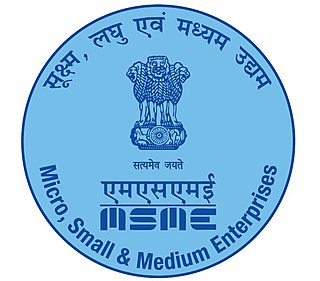
The Ministry of Micro, Small and Medium Enterprises is the ministry in the Government of India. It is the apex executive body for the formulation and administration of rules, regulations and laws relating to micro, small and medium enterprises in India. The Minister of Micro, Small and Medium Enterprises is Narayan Rane.
The Ministry of Statistics and Programme Implementation (MoSPI) is a ministry of Government of India concerned with coverage and quality aspects of statistics released. The surveys conducted by the Ministry are based on scientific sampling methods.
The National Pension System (NPS) is a defined-contribution pension system in India regulated by Pension Fund Regulatory and Development Authority (PFRDA) which is under the jurisdiction of Ministry of Finance of the Government of India. National Pension System Trust established by PFRDA is the registered owner of all assets under this scheme. National Pension System, like PPF and EPF is an EEE (Exempt-Exempt-Exempt) instrument in India where the entire corpus escapes tax at maturity and entire pension withdrawal amount is tax-free.
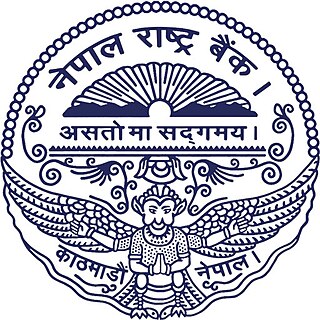
The Nepal Rastra Bank was established April 26, 1956 A.D. under the Nepal Rastra Bank Act, 1955, to discharge the central banking responsibilities including guiding the development of the embryonic domestic financial sector. As of now, the NRB is functioning under the new Nepal Rastra Bank Act, 2002. functions of NRB are to formulate required monetary and foreign exchange policies so as to maintain the stability in market prices, to issue currency notes, to regulate and supervise the banking and financial sector, to develop efficient payment and banking systems among others. The NRB is also the economic advisor to the government of Nepal. As the central bank of Nepal, it is the monetary, supervisory and regulatory body of all the commercial banks. development banks, finance companies and micro-finances institutions.

Nitish Mishra is an Indian politician hailing from eastern Indian state of Bihar, India. He represented Jhanjharpur assembly constituency in Madhubani district in 13th, 14th and 15th Bihar Legislative Assembly. Presently, he is member of 17th Bihar Legislative Assembly from Jhanjharpur and also Vice President, BJP - Bihar.

REC Limited, formerly Rural Electrification Corporation Limited, of which Power Finance Corporation Limited (PFC) is holding company, which in turn is under the ownership of the Ministry of Power, Government of India. It finances and promotes power projects across India. The PSU provides loans to Central/State Sector Power Utilities in the country, State Electricity Boards, Rural Electric Cooperatives, NGOs and Private Power Developers. On 20 March 2019, PFC signed the agreement to acquire a 52.63% controlling stake in REC for ₹14,500 crore (US$1.8 billion). On 28 March, PFC announced that it had completed making the payment for the acquisition and intended to merge REC with itself in 2020.
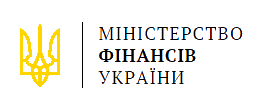
The Ministry of Finance of Ukraine is the ministry of the Ukrainian government charged with developing and implementing national financial and budget policies, and with defining national policies in customs and taxation. The ministry is responsible for ensuring that the state has enough resources to perform its functions and that financial policies promote economic growth.

The National Health Mission (NHM) was launched by the government of India in 2005 subsuming the National Rural Health Mission and National Urban Health Mission. It was further extended in March 2018, to continue until March 2020. It is headed by Mission Director and monitored by National Level Monitors appointed by the Government of India.Rural Health Mission (NRHM) and the recently launched National Urban Health Mission (NUHM). Main program components include Health System Strengthening (RMNCH+A) in rural and urban areas- Reproductive-Maternal- Neonatal-Child and Adolescent Health, and Communicable and Non-Communicable Diseases. NHM envisages achievement of universal access to equitable, affordable and quality health care services that are accountable and responsive to the needs of the people.
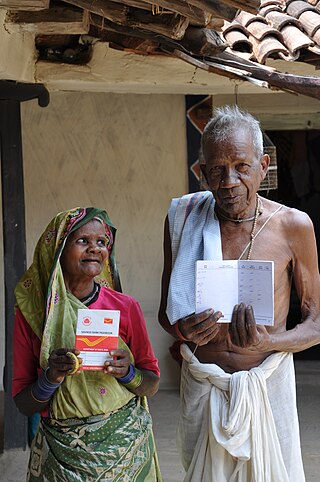
The National Social Assistance Programme (NSAP) is a Centrally Sponsored Scheme of the Government of India that provides financial assistance to the elderly, widows and persons with disabilities in the form of social pensions. The NSAP scheme only includes Below Poverty Line individuals as beneficiaries.

Corruption in Somalia pertains to purported levels of corruption within Somalia's public and private sectors according to official metrics, anti-graft measures aimed at addressing those issues, as well as political dispensations and structural changes in government affecting transparency. Owing to a reported lack of accountability in the receipt and expenditure of public funds by the Transitional Federal Government, a federal Anti-Corruption Commission was put into place in 2011 so as to deter and eliminate graft. On Transparency International's 2022 Corruption Perceptions Index, Somalia scored 12 on a scale from 0 to 100. When ranked by score, Somalia ranked last among the 180 countries in the Index, where the country ranked first is perceived to have the most honest public sector. For comparison, the country ranked first in 2022 scored 90 and the average score was 43.
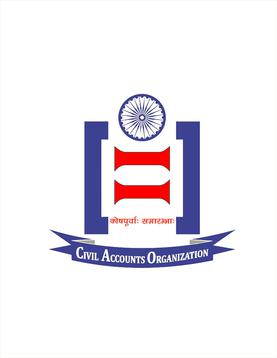
The Indian Civil Accounts Service(ICAS)(Hindi: भारतीय सिविल लेखा सेवाBharatiya Civil Lekha Seva ) is one of the Civil Services of India. ICAS is under the Department of Expenditure in the Union Ministry of Finance. The service was created in 1976 with the purpose of separating Auditing and Accounting functions of the Union Government with deputation and transfer from Indian Audit and Accounts Department. Since 1977, personnel are selected from the Civil Services Examination conducted by Union Public Service Commission, like all other Central Civil Services.
Direct Benefit Transfer or DBT is an attempt to change the mechanism of transferring subsidies launched by Government of India on 1 January 2013. This scheme or program aims to establish a Giro system to transfer subsidies directly to the people through their linked bank accounts. It is hoped that crediting subsidies into bank accounts will reduce leakages, duplicity and delay and the new processes will increase transparency and accountability.
Capital Hill Cashgate Scandal or "Cashgate" is a financial scandal involving looting, theft and corruption that happened at Capital Hill, the seat of Government of Malawi. The scandal was uncovered during the administration of President Joyce Banda, though it is believed to have begun prior to her taking office.
Unorganised Workers' Identification Number or UWIN is a proposed unique number to be issued as the identity proof to unorganised workers in India.









